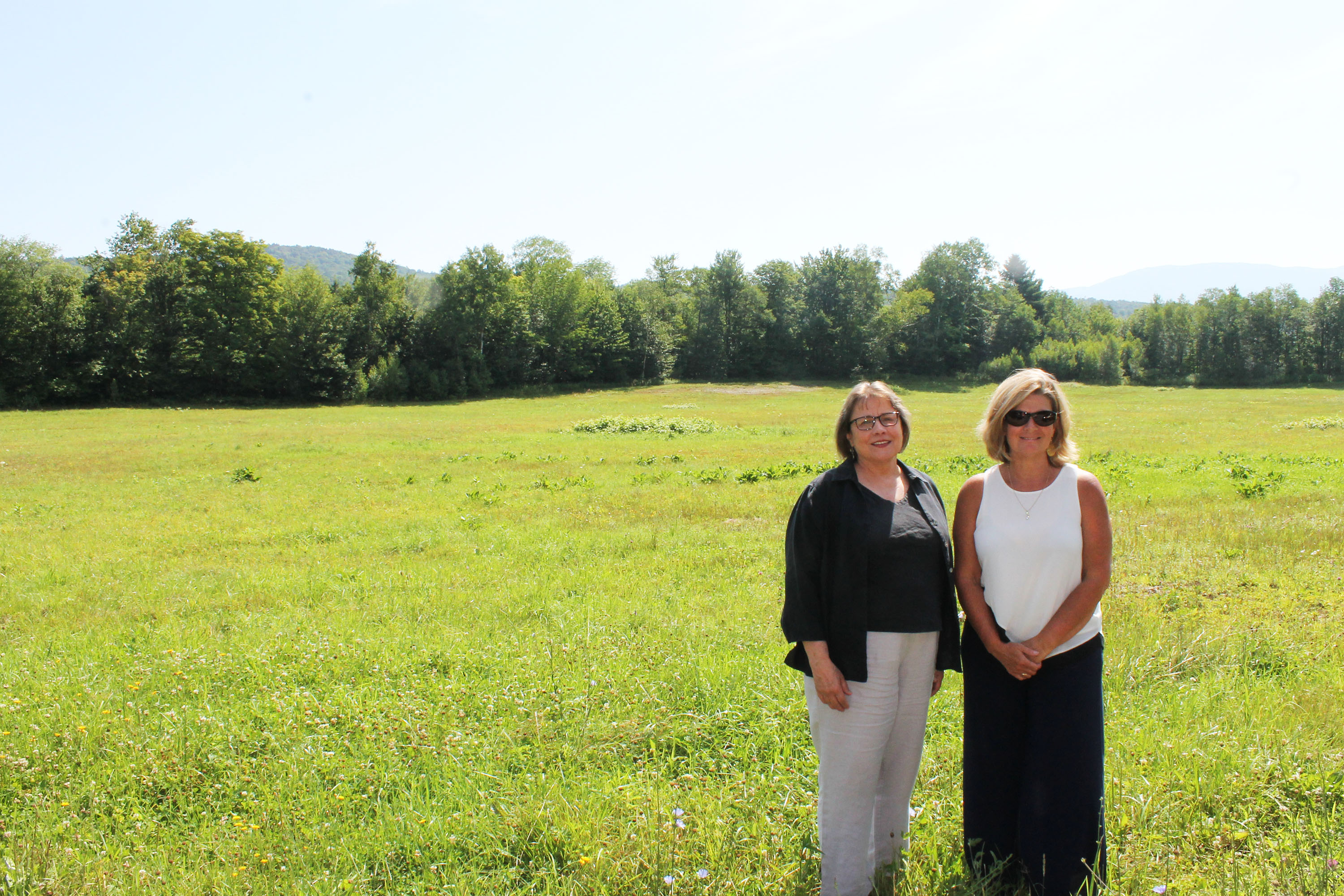
| Past Issues/Subscribe | Employment | neppa.org | Legislative Update | Advertise | October 2015 |

Vermont Public Power Communities Working Together
Interview by Courtney Crouse, NEPPA Communications Manager, with Ellen Burt, General Manager – Stowe Electric Department and Carol Robertson, General Manager – Village of Hyde Park Courtney: Thank you for taking the time from your busy schedules to allow me to interview you on your achievements and cooperative relationship. What made you want to get into this industry? How long have you been the GMs? Carol: Thirty-one years ago, I began my electric cooperative career in Georgia in an administrative management position, which included all inside functions, plus meter reading. In that first year, primarily because of member discontent with the GM, just about everybody began to leave, from the Board to senior staff. I tried to hold everything together. In 1987, I became the General Manager at a difficult time and with much to do to right the ship. It was a very fast growing cooperative. My experience goes back to the days when Enron wanted to take over cooperatives. Those were interesting times. As is today!
Courtney: Were you happy with the opportunity?
Carol: I was delighted and scared. I realized I needed to do well, so I did. This opportunity helped get my children through college and eventually allowed me to go to a much larger cooperative. After retiring, I discovered that I was actually not ready to retire. I decided to go somewhere new and different. Ellen recruited me and when she said come, I came to Vermont! I love my little Village of Hyde Park. We are responsible for the electric department (2nd smallest in Vermont) water, sewer, sidewalks, parks, planning and zoning. We promote business development, but it is a challenge for a small Vermont system. The cost of power is probably the biggest challenge - because commercial rates are high, so you have to be creative, just to keep parity is hard.
Ellen: This is because all electric utilities (IOUs, municipal and Co-ops) are regulated. Vermont is the only regulated state left in New England.
Carol: I was used to a very dynamic competitive, customer-choice environment in fast growing Georgia where you could develop rate structures rapidly and large new customers could choose their power supplier. In Georgia, electric cooperatives are not under rate regulation by the Public Service Board. The Board makes rate decisions. So, it’s been fun in the Village and almost a total career change, total lifestyle change.
Courtney: How long have you been the General Manager of Hyde Park?
Carol: Two years August 1. I’ve survived two winters! It didn’t bother me.
Now Ellen, your turn!
Ellen: Well, I’ve been working for Stowe Electric Department for 20 years. I started as the controller in 1995, and then in ‘99, I was offered the Assistant Manager position because the Manager who had been with Stowe Electric for 15 years was retiring. I took over as General Manager in 2004 and that was a real challenge because at that time the utility was not managed to its potential. There was discussion of selling the utility because it did not have the best reputation with the Town.
Carol: Let me interject, you will find that when a utility breaks down they often go to a woman. I have noticed that state-to-state, utility-to-utility. When it needs to be fixed and they’re totally demoralized and they don’t know what to do...
Ellen: They certainly did that with Green Mountain Power, the only IOU now in the State of Vermont.
Courtney: Why do you think that is?
Carol: Women have certain skills.
Ellen: Yes, get it done; make it right, we can multitask better. Women sometimes are more creative at finding solutions.
Carol: ... and it’s also the ability to take the stress and deal with the people. It’s the people issues that are the most difficult.
Ellen: Yes. When I was first hired there were challenges, especially the threat of being sold. I have a business and accounting background and until then had only worked in professional environments. So I worked very hard and implemented new procedures. And over the years I improved the staff dynamics and hired people with a passion for their jobs. My management style is definitely out-of-the-box and forward-looking.
One of the greatest challenges was definitely the transmission line project into Stowe. When I became the Assistant Manager in 2004 I was assigned to this project, a transmission line that was recognized to be upgraded 30 years prior to 2004. The project was originally estimated to cost $8 million and ended up with a price tag of $40 million. Stowe ended up disputing the cost allocation before FERC for almost two years. Stowe banded together with the other municipals and worked toward a settlement at FERC that was, I believe, for the benefit of all the Public Power systems in Vermont.
Ellen: Shortly afterward, the Village of Hyde Park contacted us because they were in difficult financial shape. And because of their size, I offered SED’s accounting and management services to them, by contract, for six years.
Courtney: Were you still here at Stowe?
Ellen: I was. After 6 years, I realized I wasn’t doing justice to all of Hyde Park’s needs. I was too busy here (Stowe) and I informed the Hyde Park Trustees that they needed to search for a manager in earnest. When I interviewed Carol I thought she was great, still do obviously, and we work well together because she is the same type of manager I am.
After that, I worked on Stowe Electric’s efficiencies, like installing AMI meters, deploying 3 electric vehicle charging stations, and filing the first EV charging station tariff in the State, using the nationally accepted ChargePoint system.
We have undertaken a great number of projects in the past few years, and then I’ve been able to hire more staff as well. For instance, Carol was talking about how one of the most difficult aspects of running an electric utility in this State is the regulatory process, its rules and regulations. In Massachusetts – one does not have that regulatory pressure and oversight. In Vermont, utilities need a lawyer to negotiate before the Public Service Department (PSD) on their behalf. A utility has to ask the PSD’s permission for just about every single thing, providing countless studies and documentation and therefore spend a considerable amount of money.
We ended up paying our law firm a great deal of money so a couple years ago I decided to hire a young lawyer straight from the Vermont Law School. So these are the kinds of creative planning we have to look at over and over.
We also just finished up the application process for another grant to help us with a PV Project. And early this year, I received a grant from the VLITE Board to install 8 more charging stations in Stowe. Stowe Electric currently owns and operates 3 EV charging stations.
Basically, this year I told my staff for the first time since I was appointed - that I can look at my staff and say we work as a great team! I feel like I finally can look back and say we’re doing really well. I believe in a team approach. Everybody is working really hard, the inside and outside crews. Everyone here is passionate about their job. What more can you ask for as a manager?
Carol: Stowe’s team is great. When your system is small, you seek out someone who has the expertise and the team you need for mutual benefit. I looked at the power resources within the state. In the south, we have the resources to create a big, diverse power mix – but for a small public power community in Vermont – diversity options within the state are an issue. I went to a friend who is a senior renewable resources executive for one of the nation’s largest investor owned utilities and asked for advice. He reviewed our VPPSA power resource report and said "solar is the thing you can do now and do it fast!" Then, with Board and voter approval, we resolved to become a more resilient community and develop local renewable resources. We applied for and received a provisional Clean Energy Development Fund grant for a small solar project. What began as a small solar array, turned into something grand.
First, economics came into play and the solar array needed to be larger. Naturally, I turned to Ellen. To achieve better economies of scale, Ellen and I decided to aggregate two individual projects, using one project developer, one attorney, etc. It made sense to work together - then and now. Shortly thereafter the Vermont RES legislation passed, which made the project even more important to our ratepayers.
Ellen: Act 56 requires 75% by 2032. 10% of that 75% must be met with distributed generation projects. The Vermont Comprehensive Energy Plan establishes a goal (not a mandate) of 90% renewables across all sectors (including home heating and transportation) by 2050. But for Hyde Park, a 1 megawatt solar project is approximately 14% of their power supply and Carol can sell the RECS.
Carol: The project will be 1 megawatt, paid for by electric revenues and with positive cash flow from day one.
Ellen: Our PV is only 2.2% of our power supply so I have to continue to support or build more. I will need three more projects to get to the 10% threshold - but I told Carol maybe I will buy her RECS!
Carol: This is what happens when you find a person/system that you can work with. We turned to Stowe for guidance and support and good things happened. We initially thought we were going to use a PPA and shifted to the Clean Energy Renewable Bonds when they became available.
Ellen: Vermont Economic Development Authority called me and they are really geared towards business development and asked if Stowe Electric had any interest in applying for a virtually 0% interest loan to build solar - called CREBs (Clean Renewable Energy Bonds). I called the two municipal managers I knew were interested in solar (Carol from Hyde Park and Michael Sullivan from Hardwick). Even though Hardwick was using a different PV developer, the three systems applied together. In this program, you have to find a bank that will work with you, and the program is a subsidy through the Treasury Department. It is not like we are receiving the money as a grant - it is basically an almost 0% loan and for Stowe, this equates to a savings of $1.5 million. And we own the project outright, instead of entering into a PPA and then purchasing it from the developer after so many years. After the debt-service is paid off, the solar energy is at no cost.
Carol: We developed the concept of the aggregated solar, meaning that each system individually owns their own solar array while gaining economies of scale by working together. We took that concept to VPPSA so that other systems might join in.
Ellen: People working together is the focus of this work! I think that is the basis of the success of ENE, MMWEC, VPPSA and CMEEC. They work together with their municipal and co-op members and get things done; I’ve seen it through ENE. We collaborate on projects and work together, and as Carol was saying, especially when you are small, that is important. You must find somebody to partner with.
Carol: I think we add value to Stowe Electric. All Vermont electric utilities are small when compared to a national standard. Technology is advancing, allowing smaller systems the ability to become more efficient, resilient and cost-effective than ever before. A new world is opening for the small utility, provided that we have a good team.
Courtney: Is there anything else you have planned for your utility or something you hope to accomplish in the future?
Carol: Oh yes - we have big goals for our systems.
Ellen: Yes, we certainly do!!!
Carol: We are really striving to create the most resilient, efficient, lowest cost and most reliable system, whether it be water, sewer or electric. We will start in one place and where we end up should be better than we planned at the start. If you could come visit in a month from now, you would be surprised what we would be up to, because we don’t always know with all the dynamic changes and opportunities. People working together, who trust each other, and have the same work ethic and integrity is the most important thing.
Ellen: We must all work together to reap the rewards.
Carol: It becomes apparent when together we accomplish tasks, achieve economies of great scale and gain more success that we could have done independently! It takes hard work, patience, trust and time. It can be a complex process but there is a synergy in working together with like-minded people. We have opportunity with many small public power communities in this county including Stowe, Morrisville, Hyde Park and Johnson. And of course Hardwick right over the border in the adjourning county. It is really the only area in the state where it is all public power, which is cool.
This gives us the ability to share resources over and above mutual aid during outages. If we need a utility pole, Don Waterhouse goes to Morrisville Electric and buys from their available stock. One of the first things I did was to go next door and ask Dave Hallquist at Vermont Electric Cooperative, "You have a lot of expertise and technology, can I rely on you, too?" Dave said: Yes, of course! The VEC substation crew is one example of expertise that we simply cannot afford and will continue to need. Stowe Electric performs our annual OSHA line audit and crew inspection. We all try to work together. We have a problem with a regulator and Hardwick offers a solution. With the new RES renewable energy mandates, greater teamwork offers enormous benefits to our ratepayers. When it comes to rolling up your sleeves and getting grants, the cooperatives are at the front of the table with federal money all the time, they have the strongest lobby with NRECA, probably the strongest of any lobby....
Ellen: Absolutely
Carol: The Co-ops are very aggressive, know the playing field and rules and are very effective at obtaining grants and federal resources for their service territories.
Ellen: We can take a lesson from the Co-ops!
Carol: The Municipals don’t appear to have that kind of power. We must learn from the cooperatives and get in the race a lot earlier and more effectively.
Courtney: Thank you Ellen and Carol for your contributions to Public Power and for sitting down with me.
 Carol Robertson and Ellen Burt - on location where the solar panels will be installed. |






